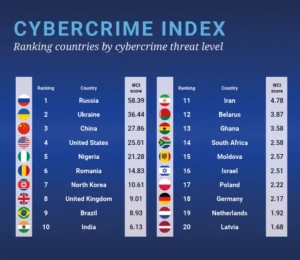World Cybercrime Index
News: The first ever ‘World Cybercrime Index’ was recently published in the journal PLOS ONE.
World Cybercrime Index:
- The first ever ‘World Cybercrime Index’, identifies the globe’s key cybercrime hotspots by ranking the most significant sources of cybercrime at a national level.
- The index was developed through a collaborative effort between the University of Oxford and UNSW Canberra.
- The Index data comes from a survey of 92 top cybercrime experts worldwide who specialize in gathering intelligence and conducting investigations on cybercrime.
- It ranks roughly 100 countries and identifies key hotspots according to various categories of cybercrime.
- The five major categories of cybercrime assessed by the study were
-
-
- Technical products/services,
- Attacks and extortion,
- Data/identity theft,
- Scams,
- Cashing out/money laundering.
-
-
Cybercrime:
- Cybercrime involves any criminal activity conducted using digital technology.
- It is estimated that cybercrime costs the world around $9.22 trillion in 2024, and this is expected to grow to $13.82 trillion in 2028.

Key Findings:
- Russia topped the list with the highest cybercriminal threat and was followed by Ukraine, China, the US, Nigeria and Romania.
- North Korea was at the 7th position, while the UK and Brazil were at the 8th and 9th positions, respectively.
- India ranked number 10 in cybercrime, with frauds involving people to make advance fee payment being the most common type.
- The researchers also found that certain kinds of cybercrimes were associated with particular countries.
-
-
- For example, the United States was associated with data and identity theft, while those related to technical products or services seemed to often originate from China.
-
-
- Among the top ranking countries, some “specialise” in cybercrime types with middling technical complexity(data and identity theft), others “specialise” in both high-tech and low-tech crimes.
-
-
-
- India was found to “specialise” in scams.
-
-
-

